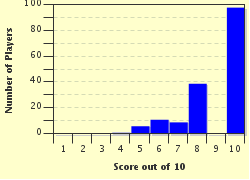Quiz Answer Key and Fun Facts
1. Based on Leviticus 23:23-25, it is the Feast of Trumpets. In Jewish tradition, it is also the beginning of the new year and celebrates God's creation of Earth as well.
2. Based on Exodus, it celebrates the Israelites' freedom from slavery.
3. Lake of fire, demons, witches, the unforgivable sin--oh, no! The Bible has some very scary ideas! Some people also call this spooky day "the devil's day".
4. It celebrates love, romance, and marriage, which the Bible has plenty of. The Song of Solomon especially correlates with this day.
5. Philippians 4:6 includes not only a basic idea behind this holiday, but most translations contain the very name of the holiday. Just don't expect to find a turkey or a pie in the verse.
6. Protestants and Roman Catholics observe this in December, but Orthodox Catholics choose to observe this on January 7. It celebrates a virgin giving birth to God's Son.
7. Matthew 2:1-7 tells of wise men visiting Christ, who was possibly a toddler at that point. This holiday celebrates the event.
8. It is an eight-day Jewish winter celebration, but the Tanakh (Hebrew Bible) doesn't actually mention it. The New Testament book of John briefly mentions it, though.
9. Inspired by passages such as Matthew 21:1-11, this celebrates Christ's entry into Jerusalem on a donkey.
10. This holiday observes the most important event in Christianity. Mary Magdalene beheld it.
Source: Author
Ceduh
This quiz was reviewed by FunTrivia editor
looney_tunes before going online.
Any errors found in FunTrivia content are routinely corrected through our feedback system.

